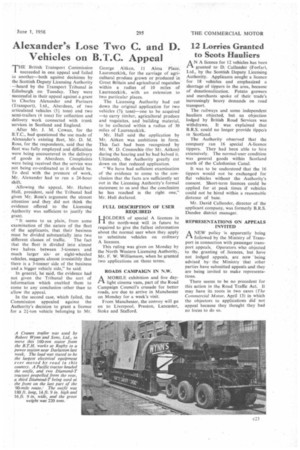Alexander's Lose Two C. and D.
Page 73

If you've noticed an error in this article please click here to report it so we can fix it.
Vehicles on B.T.C. Appeal
THE British Transport Commission I succeeded in one appeal and failed ia another—both against decisions by the Scottish Deputy Licensing Authority —heard by the Transport Tribunal in Edinburgh on Tuesday. They were successful in their appeal against a grant to Charles Alexander and Partners (Transport), Ltd., Aberdeen, of two articulated vehicles (51 tons) and two semi-trailers (4 tons) for collection and delivery work connected with trunk services in Scotland and England.
After Mr. J. M. Cowan, for the B.T.C., had questioned the use made of Alexander's existing fleet, Mr. D. M. Ross, for the respondents, said that the fleet was fully employed and difficulties were being encountered in the delivery of goods in Aberdeen. Complaints were being received that the service was not being co-ordinated as it should be. To deal with the pressure of work, Mr. Alexander had to run a 24-hour shift, Allowing the appeal, Mr. Hubert Hull, president, said the Tribunal had given Mr. Ross's argument the utmost attention and they did not think the evidence offered to the Licensing Authority was sufficientto justify the grant.
"It seems to us plain, from some examination of the nature of the fleet of the applicants, that their business must be divided substantially into two
different classes of traffic. The fact that the fleet is divided into almost two halves between 3-tonners and much larger sixor eight-wheeled vehicles, suggests almost irresistibly that there is a 3-tonner side of the business and a bigger vehicle side," he said.
In general, he said, the evidence had not given the Tribunal the sort of information which enabled them to come to any conclusion other tharr to allow the appeal.
In the second case, which failed, the Commission appealed against the Authority's decision to grant a licence for a 2i-ton vehicle belonging to Mr.
George Aitken, 11 Alma Place, Laurencekirk, for the carriage of agricultural produce grown or produced in Great Britain and agricultural requisites within a radius of 10 miles of Laurencekirk, with an extension to two particular places.
The Licensing Authority had cut down the original application for two vehicles (71 tons)—one to be acquired —to carry timber, agricultural produce and requisites, and building material, to be collected within a radius of 30 miles of Laurencekirk.
Mr. Hull said the application by Mr. Aitken was ambitious in form. This fact had been recognized by Mr. W. D. Connochie (for Mr. Aitken) during the hearing and he had halved it. Ultimately, the Authority greatly cut down on that reduced application.
"We have had sufficient examination of the evidence to come to the conclusion that the facts are sufficiently set out in the Licensing Authority's formal statement to us and that the conclusion he has reached is the right one," Mr. Hull declared.
FULL DESCRIPTION OF USER REQUIRED UOLDERS of special A licences in
the north-west will in future he required to give the fullest information about the normal user when they apply to substitute vehicles on ordinary A licences.
This ruling was given on Monday by the North Western Licensing Authority, Mr. F. W. Williamson, when he granted two applications on those terms.
ROADS CAMPAIGN IN N.W.
A MOBILE exhibition and five dayI-1 light cinema vans, part of the Road Campaign Council's crusade for better roads, are due to arrive in Manchester on Monday for a week's visit.
From Manchester, the convoy will go on to Liverpool, Preston, Lancaster, Stoke and Stafford.
12 Lorries Granted to Scots Hauliers
AN A licence for 12 vehicles has been granted to D. Callander (Forfar), Ltd., by the Scottish Deputy Licensing Authority. Applicants sought a licence for 18 vehicles and emphasized a shortage of tippers in the area, because of denationalization. Potato growers and merchants spoke of their trade's increasingly heavy demands on road transport.
The railways and some independent hauliers objected, but an objection lodged by British Road Services was withdrawn. It was explained that B.R.S. could no longer provide tippers in Scotland.
The Authority observed that the company ran 16 special A-licence tippers. They had been able to hire extensively. The normal-user condition was general goods within Scotland south of the Caledonian Canal.
It was to be understood that the 16 tippers would not be exchanged for flat vehicles without the Authority's consent. Short-term licences could be applied for at peak times if vehicles could not be hired within a reasonable distance of base.
Mr. David Callander, director of the applicant company, was formerly B.R.S. Dundee district manager.
REPRESENTATIONS ON APPEALS INVITED
ANEW policy is apparently being followed by the Ministry of Transport in connection with passenger transport appeals. Operators who objected to the granting of licences, but have not lodged appeals, are now ' being advised by, the Ministry that other parties have submitted appeals and they are being invited to make representations.
There seems to be no precedent for this action in the Road Traffic Act. It may have its roots in two cases (The Commercial Motor, April 13) in which the objectors to applications did not appeal because they thought they had no locus to do so.




























































































































































































































































